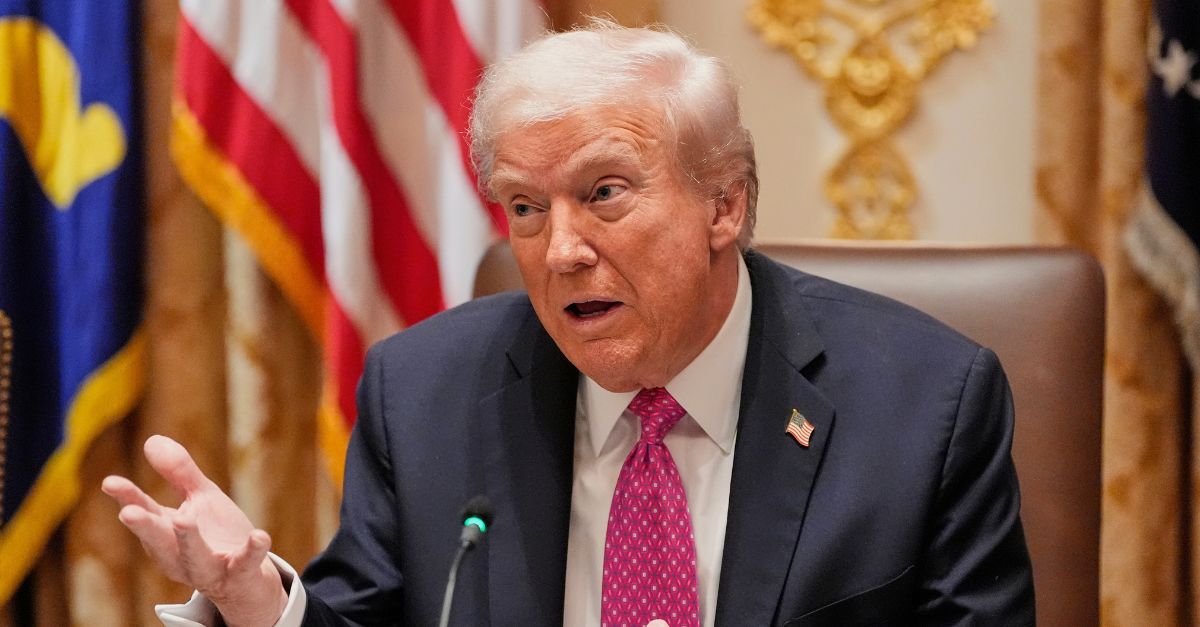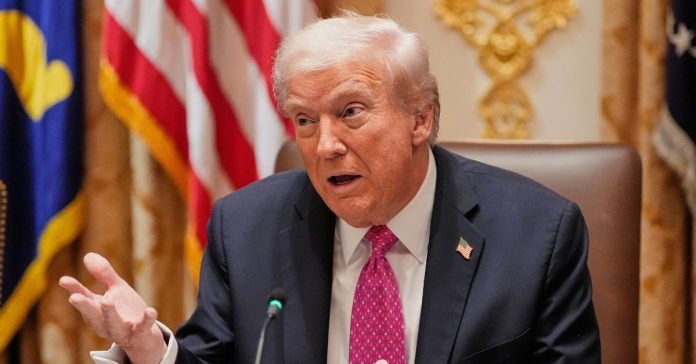
President Donald Trump speaks before a lunch with Ukraine”s President Volodymyr Zelenskyy in the Cabinet Room of the White House, Friday, Oct. 17, 2025, in Washington (AP Photo/Alex Brandon).
West Coast states opposed to the Trump administration’s attempted use of their National Guard troops to police the city of Portland won a quick reprieve from a federal judge late Tuesday.
Early Tuesday, the attorneys general of Oregon and California asked U.S. District Judge Karin Immergut, who was appointed by President Donald Trump during his first term in office, to wait before staying one of her own restraining orders previously issued in the case.
One such restraining order, to a certain extent at least, may not be long for this earth — after a similar order was stayed by a three-judge panel of the U.S. Court of Appeals for the 9th Circuit on Monday.
But the issues here are plainly not cut and dry.
Love true crime? Sign up for our newsletter, The Law&Crime Docket, to get the latest real-life crime stories delivered right to your inbox.
The underlying litigation was filed on Sept. 28, premised on alleged violations of statutory law concerning troop deployments, the Administrative Procedure Act (APA), and the Constitution. Originally, only Oregon sued to stop the deployment of troops to Portland.
On Oct. 4, Immergut granted a temporary restraining order which expired on Oct. 18. The court’s order barred “the federalization and deployment of Oregon National Guard service members.”
The Trump administration immediately appealed to the U.S. Court of Appeals for the 9th Circuit, seeking a stay and, later that same night, apparently tried an end-run around Immergut’s restraining order by communicating its intent to use 200 members of the California National Guard in Portland in lieu of the Beaver State’s own troops.
On Oct. 5, in response to the threat of Golden State troops being activated, California joined the litigation and filed an amended complaint as well as a second motion for a temporary restraining order — which Immergut granted that very same day.
The second restraining order, more broadly, enjoined the government “from deploying federalized members of the National Guard in Oregon.” And, similarly, expired on its own terms on Oct. 19.
On Oct. 15, after a hearing, the district court found “good cause to extend” both of its own temporary restraining orders — pending the results of the then-ongoing appeal with the 9th Circuit.
On Oct. 20, a three-judge panel on the 9th Circuit voted to stay the first restraining order in a relatively clear victory for the Trump administration. The 2-1 majority decision was penned by Trump-appointed U.S. Circuit Judge Bridget S. Bade, with a concurrence by Trump-appointed U.S. Circuit Judge Ryan D. Nelson. In dissent was Bill Clinton-appointed U.S. Circuit Judge Susan P. Graber.
Notably, while the second restraining order was not appealed by the federal government or formally considered by the trio of judges, the 9th Circuit strongly suggested that order should be paused as well.
“The district court stated that it granted the second TRO based on the same legal reasoning it provided in its order issuing the first TRO,” the panel’s opinion reads. “Defendants are thus correct that the first TRO and the second TRO rise or fall together on the merits of the issues raised in this motion for a stay pending appeal.”
So, despite the lack of formal consideration, the U.S. Department of Justice, in turn, asked Immergut to formally stay her second restraining order in a motion to dissolve filed on Tuesday.
“Given the Ninth Circuit’s clear statements on the second TRO’s validity, the Court should address this motion in part today and without awaiting plaintiffs’ response,” the DOJ argued. “The Court should immediately dissolve or stay the second TRO to the extent it overlaps with the now-stayed first TRO (i.e., to the extent it applies to the Oregon National Guard). The Court should dissolve or stay the second TRO in full after plaintiffs file their response.”
Meanwhile, however, the 9th Circuit had other things in mind.
In a sua sponte — or “of one’s own accord”— order filed late Monday, a judge on the bench moved to have the full court reconsider the Immergut restraining order en banc. This is an uncommon, but not rare, break from typical reconsideration requests – which are more often than not filed by one of the parties to the litigation.
Oregon and California moved to seize the fast-shifting legal terrain.
In their response motion to the motion to dissolve, the states asked Immergut to deny the motion to stay her second order — citing the sua sponte motion filed by U.S. Circuit Judge S. R. Thomas, a Clinton appointee.
“Until there is an en banc vote, it would be legal error for this Court to construe the panel’s non-final decision as a ‘significant change in the law’ warranting dissolution of the Second TRO,” the states’ motion reads.
The plaintiffs went on to blame the DOJ for errors of its own making.
“Had Defendants appealed the Second TRO, the relief they now seek from this Court would already be before the Ninth Circuit,” the states’ motion goes on. “But they chose not to appeal the Second TRO, which raises factual and legal issues that extend far beyond the Stay Order. Now, in their rush to file their Motion to Dissolve, Defendants have misconstrued the finality of the Ninth Circuit proceedings, failing to carry their burden for dissolution of the Second TRO.”
Immergut, for her part, agreed with the plaintiffs — at least for now. The court did not rule in the defendants’ favor without waiting to hear from the states — which was what the DOJ had requested.
Instead, the judge ordered the Trump administration to reply to the states’ arguments in another court filing due Thursday afternoon.

